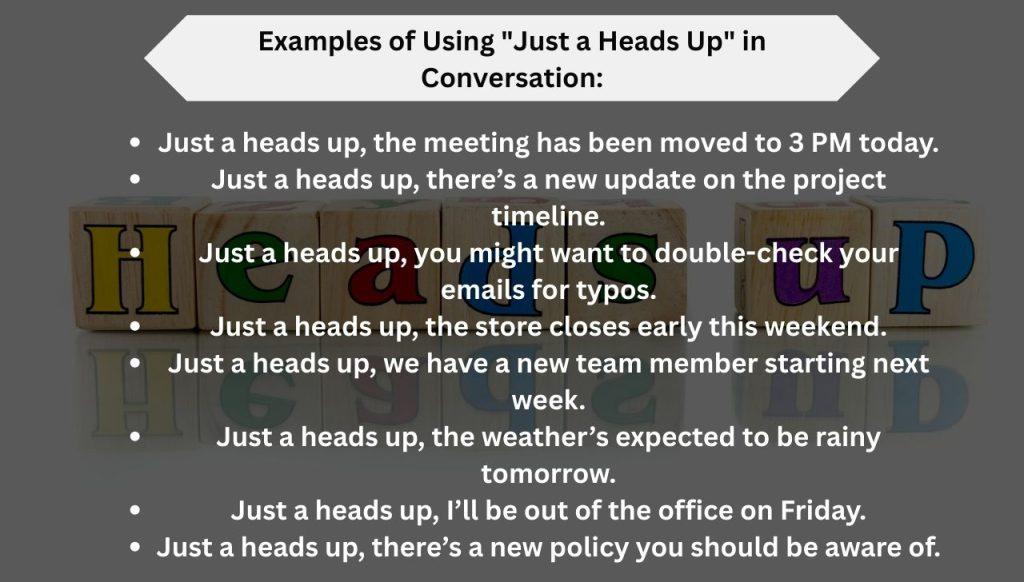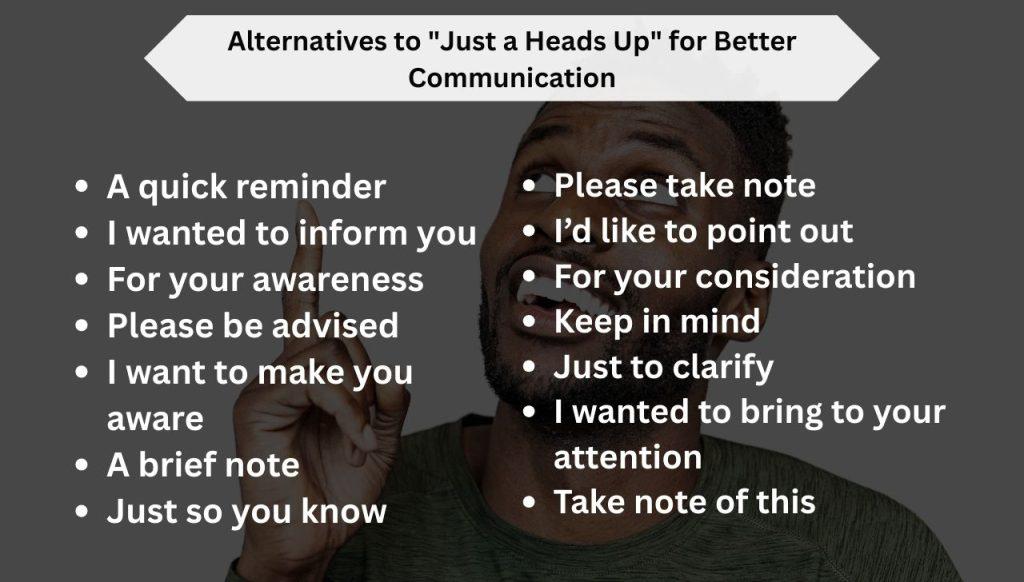“Just a Heads Up”: The Right Way to Use This Phrase
The phrase “just a heads up” is a simple way to let someone know that important information or a significant action is coming their way. It comes from everyday language and is quite common in casual talk. This phrase helps to prepare someone mentally and emotionally, so they aren’t surprised by what comes next.
It’s like giving a gentle nudge that something needing attention or quick action is approaching. By saying this, the speaker shows thoughtfulness and respect, giving the other person a chance to prepare for what will be shared.
When to Use “Just a Heads Up” in Conversation
Knowing when to say “just a heads up” is key to clear and effective communication. This phrase helps to alert someone about information that might influence their plans or actions, giving them time to adapt.
It fits nicely in both work and personal conversations when the news you have to share is necessary but not urgent. For example, if a meeting time changes, telling a colleague, “Just a heads up, the meeting time has changed,” helps them rearrange their schedule calmly. Or, if you’re running late to meet a friend, saying, “Just a heads up, I’ll be a bit late,” keeps them informed and adjusts their expectations without fuss.

Examples of Using “Just a Heads Up” in Conversation:
Using “Just a heads up” in conversation is a casual and effective way to bring someone’s attention to something important or noteworthy. It works well for offering reminders, giving early warnings, or simply ensuring others are aware of something without sounding too formal.
- Just a heads up, the meeting has been moved to 3 PM today.
- Just a heads up, there’s a new update on the project timeline.
- Just a heads up, you might want to double-check your emails for typos.
- Just a heads up, the store closes early this weekend.
- Just a heads up, we have a new team member starting next week.
- Just a heads up, the weather’s expected to be rainy tomorrow.
- Just a heads up, I’ll be out of the office on Friday.
- Just a heads up, there’s a new policy you should be aware of.
- Just a heads up, your package should arrive by the end of the day.
- Just a heads up, I might need to reschedule our meeting next week.
- Just a heads up, I’ll need your feedback on the report by Thursday.
- Just a heads up, the elevator is out of service for maintenance.
- Just a heads up, there’s a traffic jam on the main road.
- Just a heads up, we’re going to have a surprise guest at dinner tonight.
- Just a heads up, there’s a delay with your flight.
- Just a heads up, I’m bringing my dog to the park later.
- Just a heads up, the coffee machine is broken.
- Just a heads up, there’s a sale at the mall this weekend.
- Just a heads up, you might want to bring an umbrella.
- Just a heads up, the deadline has been extended by two days.
- Just a heads up, I’ll be running late to our meeting.
- Just a heads up, I heard there’s a change in the presentation schedule.
- Just a heads up, there’s a new rule about parking on campus.
- Just a heads up, I think I left my wallet in your car.
- Just a heads up, we’re starting the team-building exercise in 10 minutes.
Read Also “I Wish You the Best”: Meaning, Usage, and Context

Alternatives to “Just a Heads Up” for Better Communication
In communication, it’s important to use phrases that clearly express intention without sounding repetitive. “Just a heads up” is often overused and can lose its impact. Here are alternative phrases that can make your communication more engaging, clear, and professional.
- A quick reminder
- I wanted to inform you
- For your awareness
- Please be advised
- I want to make you aware
- A brief note
- Just so you know
- Kindly note
- Please take note
- I’d like to point out
- For your consideration
- Keep in mind
- Just to clarify
- I wanted to bring to your attention
- Take note of this
- Let me update you
- Allow me to inform you
- I’d like to highlight
- Please be aware
- A quick update
- This is for your reference
- Just to let you know
- Here’s something to consider
- I’d like to draw your attention to
- A little heads-up for you
Common Mistakes to Avoid with “Just a Heads Up”
Using the phrase “just a heads up” too often can make it lose its impact. It might even start to annoy people. It’s also not great for giving serious feedback. When used this way, it can make the message unclear.
Moreover, if there’s something urgent or complex, saying “just a heads up” might downplay the importance, leading to confusion or delays. To avoid these issues, it’s best to use the phrase only to share preliminary information that doesn’t need immediate action. This keeps its use clear and valuable.
How “Just a Heads Up” Can Enhance Professional Communication
Using the phrase “just a heads up” effectively can help in professional settings. It is an early alert that lets people know something important is coming. This way, everyone can brace themselves without immediately getting bogged down in too many details.
It’s about keeping everyone in the loop and ready for what’s next. This tactic can prevent misunderstandings since it prepares the ground for a deeper conversation later. Using wisely makes the team more alert and coordinated, helping things run more smoothly. In short, “just a heads up” is a simple but powerful way to keep everyone engaged and proactive.
Conclusion
Using the phrase “just a heads up” correctly is key to clear communication. This phrase acts as a gentle introduction before you share something important. It shows respect and helps keep your conversations clear. Be mindful of how you use it, especially in professional environments, to maintain effectiveness and strengthen your connections. Knowing when and how to say “just a heads up” helps rather than hinders your communication.
So, let’s talk about this phrase. It’s not just about warning someone; it’s about preparing them. Think of it as a polite nod before you deliver news, ensuring the other person is ready to listen. Use it wisely, and it will serve you well in keeping your discussions straightforward and meaningful.







